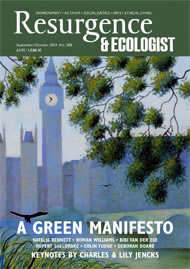A while ago I asked you for your comments on the 10 most critical strategic interventions needed to put us on the path to delivering wellbeing for people and the planet. I had lots of great feedback from Resurgence & Ecologist readers. Here are some of the things you wrote:
Joint campaigns with other environmental groups was the suggestion of reader Jan Metcalf, as “we badly need to flex some unified muscle, to be a respected and recognised political force for change … United we must stand to counter the huge and it seems growing power of global organisations and their powerful lobbyists.” I agree. Bringing about the scale of transformational change we need requires a Herculean effort and is not something Friends of the Earth can – or plans to – achieve on its own, but we will do so through working in alliances and partnerships and engaging and involving more people.
For reader June Emerson, the biggest challenge is how we tell powerful stories of “a positive new world order, a ‘new normal’ not ruled by power and profit and that people could identify with. Stories of success breed success – and who knows what might follow on?” Absolutely. We have to show that change is possible and inspire people and offer hope. Our Big Ideas project is looking to identify what needs to change to focus some of humanity’s amazing abilities on solving the challenges we face and building a brighter future for everyone.
Robert Smith came up with the very practical idea of “every building (whether public or private sector) with above, say, 10 employees on site identifying an Energy Champion, who would typically be the office manager, caretaker, etc. – i.e. the person with their hands actually on the heating or lighting controls”. Key to Robert’s thinking was the need to incentivise saving energy in the large non-domestic sector, which is responsible for 42% of total UK CO2 emissions. It is really important that we find such ways to engage people.
One word summed it all up for reader Eddie Lawyer: power. We live in a state that has ceded power to companies, and, in Eddie’s words, “we have to put power back into our local communities. This can only be done by giving local people the self-belief that the name Resurgence implies, but which is thin on the ground.” Empowering people is at the heart of our Fair Transition programme, about which readers will hear more soon.
Colin Mortlock directed me to a charity he runs, www.spiritofadventure.org, a movement committed to changing the modern world so that it lives in harmony with Nature – which chimes with FoE’s Nature Programme and our bees campaign, which has set the nation buzzing on the need to save the British bee.
Henry Cox shared his thoughts on several issues, including the future of money. In May this year we helped run a major conference on transforming finance, which brought together leading academics, finance professionals and campaigners to discuss how to make finance work in the long-term interests of people and planet. The conference was a great success and we’re looking for ways to follow it up.
The East Devon Resurgence readers’ group made suggestions for what each of our five transformative programmes could focus on, ranging from following the German example of community energy project funding to putting Nature/ecological thinking back into the primary-school curriculum. James Goodwin also pointed out the need for meaningful engagement with communities through support for schools. Picking up on the Eco-Schools movement, of which primary schools have been the main beneficiaries, James stressed the need to engage with the young adults of tomorrow through secondary schools. We’re looking at how to enthuse and work with young people, including learning from Young Friends of the Earth Europe, a grassroots network of young people and youth organisations who organise events and inspire young people to take action on a range of issues.
Richard Garvey-Williams and Sheena Howarth both underlined the need to raise debate on the issue of population growth. We have just produced a new briefing on the issue, Global Population, Consumption and Rights. It builds on the recommendations by The Royal Society report People and the Planet, published in April 2012, which outlines the severe damage being done to ecosystems and ecosystem services as a result of human activity – damage that is also highlighted by the work of Rockström et al. on planetary boundaries. The report argues that in order to ensure that future generations can live within a stable, healthy and bountiful environment – including in the context of climate change – it is necessary to address both rising consumption levels and a growing population. Friends of the Earth will be raising these issues through our Big Ideas Change the World project.
Jakob von Uexkull of the World Future Council directed me to the council’s Global Policy Action Plan, which sets out their perspective on critical interventions. There are many overlaps with work being done across Friends of the Earth that it would be good to explore!
Thanks to readers for their thoughtful feedback, which I will be sharing with our programme teams. Do check our website foe.co.uk to find out more and see what action you can take right now with Friends of the Earth.
For more information on Friends of the Earth's Big Ideas Change the World project: https://www.foe.co.uk/what_we_do/about_us/big_ideas_change_the_world_40167.html







